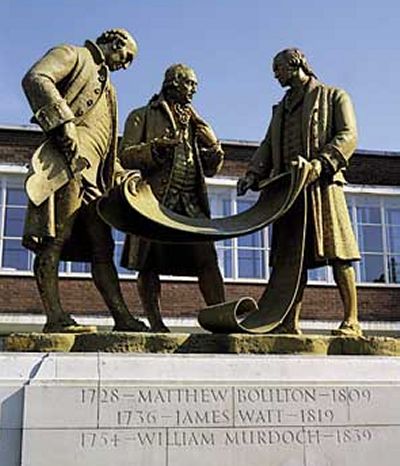|
||||||||||
|
|
||||||||||
|
||||||||||
|
|
||||||||||
As for Mr. Boulton, it has proven rather difficult to pin down very much information about him. Described below is a very brief history of his life that we've managed to piece together from a number of different sources. However, it is not always clear whether the M. Boulton mentioned in these sources is the same M. Boulton of aileron fame, so we cannot fully guarantee the accuracy of this answer.
That disclaimer aside, we believe that Boulton's full name was Matthew Piers Watt Boulton. Boulton lived in England and was rather a rennaissance man of the mid to late 19th century. He studied a number of different scientific, literary, and philosophical fields. His name comes up frequently in connection to rare books, and his titles include an amazing variety of subjects. Among these are books about photography dating from the early 1860s, translations of the classics Iliad and ∆neid from the mid 1870s, papers regarding metaphysics from the late 1870s, and studies of solar heat written during the early 1890s. His earliest publication was published in 1841, and the last item we could locate that mentions his name was a catalogue of his estate published by the auction house Christie, Manson & Woods in 1911. According to this document, Matthew Piers Watt Boulton had died in 1894.
However, only one of his many publications appears to concern the subject of aeronautics. Entitled "On aŽrial locomotion," the document was published in 1864, four years before Boulton received his aileron patent. It is within this publication that Boulton probably first coined the term aileron, meaning "little wing," and described how such a device could be used to perform the function to which the modern aileron was later applied by Frenchman Henri Farman.

Unfortunately, that is all the information we've been able to collect on Matthew Boulton's aeronautics research. A
few other interesting tidbits about his life concern his family history. Matthew Piers Watt Boulton was the son
of Matthew Robinson Boulton. He was named after his grandfather, Matthew Boulton, as well as his grandfather's
close associate, James Watt. Boulton and Watt had perfected the steam engine during the 1770s which soon set off
the Industrial Revolution in England, and later the rest of the world. The family lived in Birmingham, England,
but it appears that M. P. W. Boulton moved to Oxfordshire after selling his grandfather's Soho House in 1850.
- answer by Joe Yoon, 20 July 2003
Read More Articles:


|
Aircraft | Design | Ask Us | Shop | Search |

|
|
| About Us | Contact Us | Copyright © 1997- | |||
|
|
|||